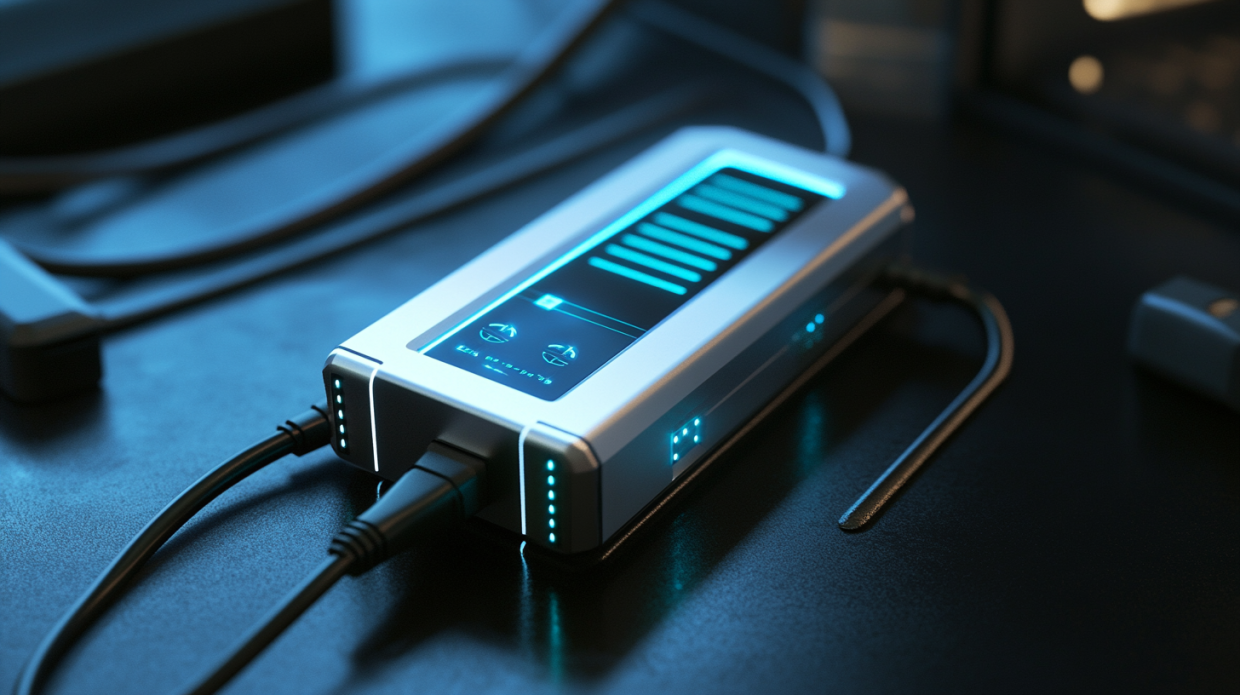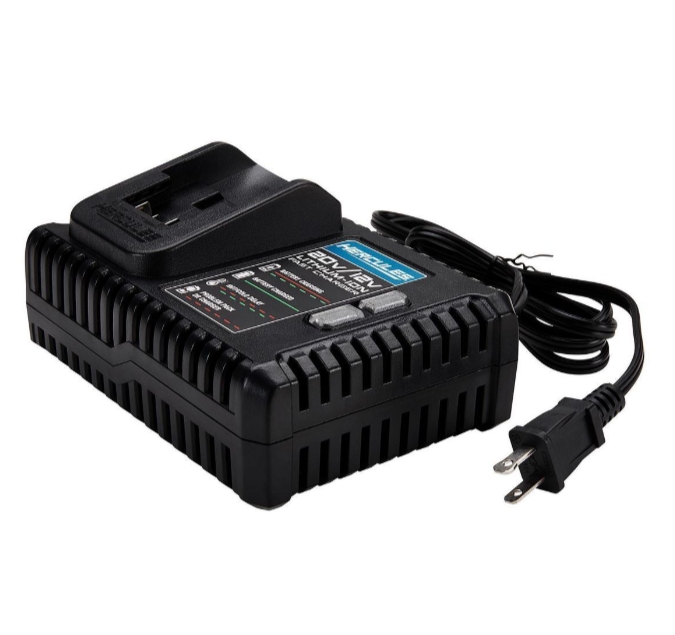
HERCULES 20V/12V Lithium-Ion Multivoltage Charger
- Keep your HERCULES™ lithium-ion batteries fully charged at all times with this powerful, lightweight battery charger. The microprocessor control chargers batteries fast yet prevents overcharging, overheating or charging when there is damage to a battery cell.
- Charges all HERCULES™ 20V and 12V lithium ion batteries
- LED status indicator lights give you accurate updates on charge time remaining
- Prevents overcharge, hot/cold extreme charging, charging when battery is damaged
- Can be wall-mounted
$44.99
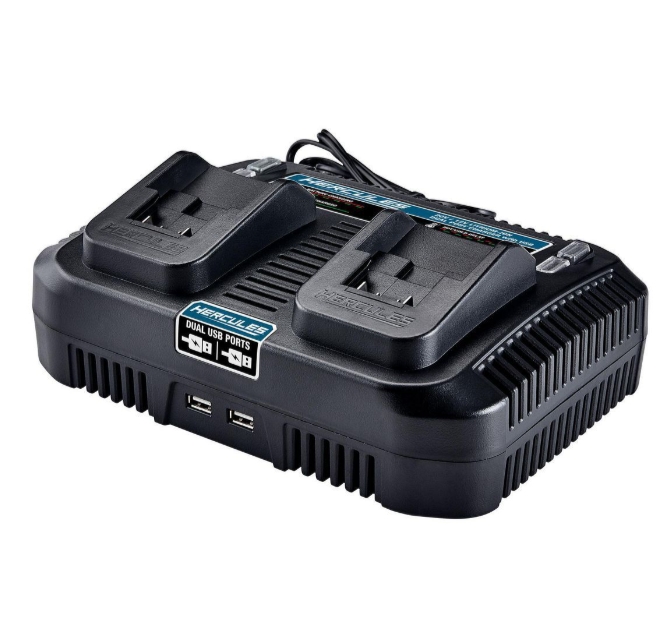
HERCULES 20V/12V Lithium-Ion Multivoltage Dual Port Charger with Dual USB
- MSRP – $59.50 / Casual Pants
- CASUAL COMFORT: Crafted with 97% Polyester and 3% Spandex, these jogger pants by bar III are your perfect companion for a casual day out, offering superior comfort and a modern look.
- ✨ MADE IN VIETNAM: These Contrast-Trim Casual Jogger Pants are produced in Vietnam, ensuring great quality and craftsmanship.
$69.99
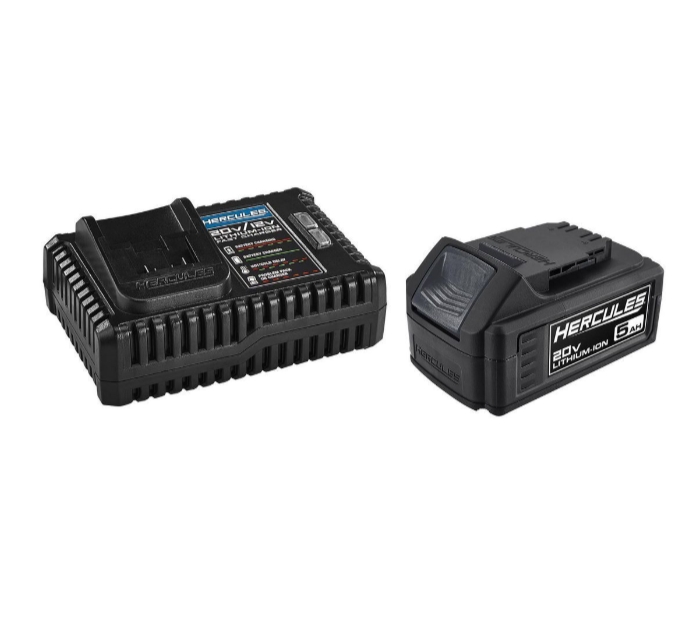
HERCULES 20V 5 Ah Lithium-Ion Battery and 4 Amp Charger Starter Kit
- The HERCULES™ Multivoltage Dual Port Charger with Dual USB eliminates downtime by keeping all your batteries and devices fully charged. All ports can deliver full power at the same time. Built with integrated dual mounting holes for permanent mounting and a durable housing to withstand jobsite abuse.
- Charges 2 batteries simultaneously
- Integrated mounting holes
- Durable enough to withstand jobsite abuse
$119.99
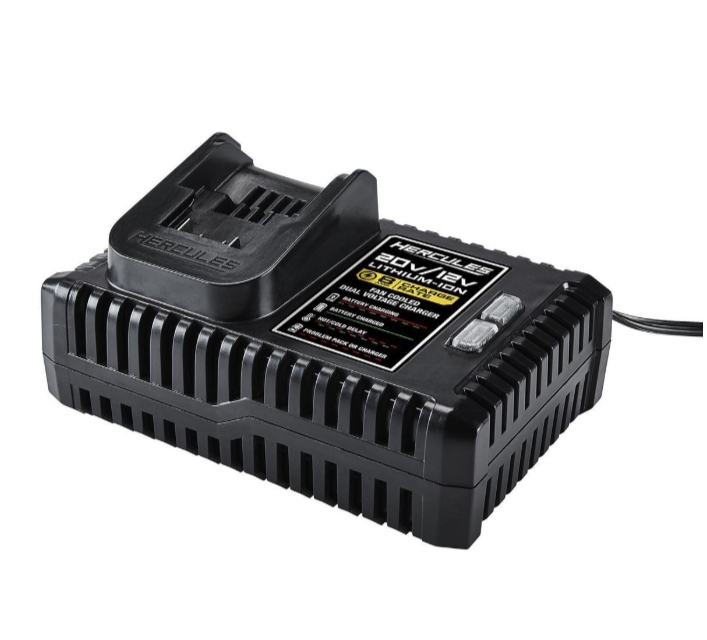
HERCULES 20V/12V Dual Voltage, Fan Cooled Lithium-Ion Battery Charger
- Get up to 50% faster charging* with this HERCULES™ 20V/12V Dual Voltage, Fan Cooled Lithium-Ion Battery Charger. This powerful battery charger fully charges 2.0 Ah, 12V batteries in as little as 30 minutes.
- Charges all HERCULES™ 20V and 12V lithium-ion batteries
- Fan cooled to prevent overheating
- LED charge indicator
- Can be wall-mounted
$74.99
As I stand in my garage, surrounded by tools, equipment, and various battery-powered devices that have become essential to my daily life, I can’t help but reflect on how a quality battery charger has become one of my most valuable possessions. After years of frustration with dead batteries and unreliable chargers, discovering the Hercules line of battery chargers was nothing short of revolutionary for me. Today, I’m excited to share everything I’ve learned about these powerful charging solutions that have transformed how I maintain my equipment.
My Journey to Discovering Hercules
Let me take you back to last winter when my car wouldn’t start on a particularly frigid morning. I was already running late for an important meeting, and there I was, stranded in my driveway with a dead battery and a useless charger that had worked perfectly fine just weeks before. That moment of frustration led me down a rabbit hole of research that eventually introduced me to the world of Hercules battery chargers.
A reliable battery charger is not a luxury—it’s an essential investment that pays dividends in convenience, safety, and peace of mind. This realization changed my approach to maintaining all my battery-powered equipment, from my car to my lawn tools to my recreational vehicles.
What Exactly Is a Hercules Battery Charger?
Before diving into the nitty-gritty details, let’s clarify what makes a Hercules battery charger stand out in a market flooded with options.
Hercules battery chargers are premium power solutions designed to efficiently and safely restore energy to various types of batteries. Known for their robust construction and advanced technology, these chargers have earned a reputation for reliability among professionals and everyday users alike.
The Hercules brand has positioned itself as a leader in charging technology by focusing on creating products that combine durability, versatility, and intelligent charging capabilities. Unlike cheaper alternatives that often damage batteries over time, Hercules chargers are engineered to optimize battery performance and extend overall battery life.
What impressed me most when I first got my hands on a Hercules charger was the solid feel of the unit. This wasn’t a flimsy plastic box with a couple of wires; it felt like a professional-grade tool built to last. The attention to detail was evident from the moment I unpacked it.
The Science Behind the Power: How Hercules Battery Chargers Work
Understanding how these chargers work helped me appreciate their value. Hercules battery chargers employ sophisticated multi-stage charging technology that adapts to the specific needs of your battery.
The typical charging process involves several phases:
- Diagnostic Phase: The charger first analyzes the battery’s condition, identifying issues like sulfation or dead cells that might affect the charging process.
- Bulk Charging: During this initial stage, the charger delivers maximum current to rapidly bring the battery up to about 80% of its capacity.
- Absorption Phase: The charger reduces the current while maintaining a constant voltage, carefully topping off the battery to its full capacity without overcharging.
- Float/Maintenance Mode: Once fully charged, the charger switches to a trickle charge that maintains optimal battery levels without damaging the cells.
- Pulse Maintenance: Some advanced Hercules models use pulse technology to prevent battery stratification and extend battery life during long-term storage.
What sets Hercules apart is the precision of its microprocessor-controlled charging algorithms. These smart systems constantly monitor battery temperature, voltage, and resistance, making micro-adjustments to the charging parameters to ensure optimal performance.
I was particularly impressed by how my Hercules charger seemed to rejuvenate an older battery that I had nearly written off. The desulfation feature effectively broke down the crystalline deposits that had formed on the battery plates, significantly improving its performance.
Finding Your Perfect Hercules: Where to Buy
After deciding to invest in a Hercules charger, I found several reliable purchasing channels. Authorized dealers provide the most secure buying experience, ensuring you receive genuine products with full warranty coverage.
You can find Hercules battery chargers at:
- Specialty automotive supply stores
- Major hardware retail chains
- Professional tool suppliers
- Online marketplaces (with caution)
- The official Hercules website or authorized online retailers
I purchased mine from a local automotive supply shop, which gave me the advantage of speaking with knowledgeable staff who helped me select the right model for my needs. However, I’ve since purchased additional models online when I found good deals from authorized sellers.
A word of caution: The market has seen counterfeit Hercules products. Always verify you’re buying from an authorized dealer, especially when shopping online. The price difference between a genuine Hercules and a knockoff might be tempting, but the performance gap and safety risks make it a poor bargain.
Compatibility Considerations: Will It Work With Your Batteries?
One of the most common questions I had—and one I frequently hear from others—concerns compatibility. Hercules offers various models designed for specific battery types, but many of their advanced chargers are impressively versatile.
Most standard Hercules chargers work with:
- Traditional lead-acid batteries
- AGM (Absorbent Glass Mat) batteries
- Gel cell batteries
- Deep cycle batteries
- Marine batteries
Some specialized models are compatible with:
- Lithium-ion batteries (with specific charging profiles)
- LiFePO4 (Lithium Iron Phosphate) batteries
- Small recreational vehicle batteries
- Commercial-grade equipment batteries
I discovered that compatibility isn’t just about battery chemistry—voltage is equally important. Hercules offers chargers for 6V, 12V, and 24V systems, with some premium models automatically detecting and adjusting to the battery voltage.
What I appreciate most is how Hercules chargers include built-in safeguards that prevent you from accidentally damaging incompatible batteries. The diagnostic phase typically identifies potential compatibility issues before charging begins.
Getting Started: Using Your Hercules Battery Charger
When I first unboxed my Hercules charger, I was admittedly intimidated by all the settings and displays. However, I quickly discovered that the user experience had been thoughtfully designed.
Here’s my simplified guide to using a Hercules battery charger:
- Safety First: Always ensure you’re in a well-ventilated area, as batteries can emit hydrogen gas during charging.
- Connection Sequence: Connect the positive (red) clamp to the positive battery terminal first, then connect the negative (black) clamp to the negative terminal (or to a grounded metal part of the vehicle frame if charging in the vehicle).
- Settings Selection: Select the appropriate battery type and charging mode. Most models have intuitive interfaces with preset options.
- Initiate Charging: Once connected, the charger will begin its diagnostic phase before moving into active charging.
- Monitor Progress: Modern Hercules chargers display charging progress, estimated completion time, and battery health information.
- Disconnection: When charging is complete, disconnect in reverse order—negative clamp first, then positive.
I was particularly impressed with the automatic features on my model. It adjusts the charging rate based on battery condition and ambient temperature, elements I would never have thought to consider with my old charger.
Standout Features That Make Hercules Worth the Investment
After using various charger brands over the years, several Hercules features stand out as genuine game-changers:
- Spark-Proof Technology: The connections are designed to prevent sparking, a safety feature I’ve come to appreciate after a few nerve-wracking experiences with older chargers.
- Reverse Polarity Protection: The charger won’t activate if connections are reversed, preventing potential damage to both the battery and charger.
- Adaptive Charging Technology: The microprocessor adjusts charging parameters in real-time, optimizing the process for maximum battery life.
- Recovery Mode: Many models include a recovery function for rejuvenating deeply discharged batteries that other chargers might refuse to charge.
- Temperature Compensation: Advanced sensors adjust charging rates based on ambient temperature to prevent overcharging in hot conditions or undercharging in cold environments.
- Multi-Battery Support: Some models can charge and maintain multiple batteries simultaneously, a feature I found invaluable for my workshop.
- Portable Design: Despite their robust construction, many Hercules chargers are surprisingly portable, with integrated handles and storage solutions for cables.
- LCD Displays: The information-rich displays provide detailed insights into charging progress and battery health.
The combination of these features creates a charging experience that’s both user-friendly and technically sophisticated.
Charging Times: How Long Will You Wait?
When I first switched to a Hercules charger, I was surprised by the efficiency of the charging process. While charging times vary based on battery capacity, type, and condition, I’ve observed consistent patterns.
For a standard 12V automotive battery (approximately 50Ah capacity):
- A deeply discharged battery typically reaches full charge in 8-12 hours
- A moderately discharged battery (30-50% capacity remaining) reaches full charge in 4-6 hours
- Maintenance charging occurs continuously when connected to stored vehicles
The bulk charging phase is remarkably quick, often bringing batteries to 80% capacity in half the total charging time. This rapid initial charge has saved me on numerous occasions when I needed to get equipment running quickly.
What I’ve come to appreciate is the charger’s honesty—its display gives remarkably accurate estimates of remaining charging time. Unlike my previous chargers that would show “full” when the battery was barely charged enough to start an engine, the Hercules gives a true picture of battery status.
Beyond Cars: Using Hercules for Diverse Applications
While I initially purchased my Hercules charger for my automotive needs, I’ve since found it invaluable for maintaining a variety of equipment:
Automotive Applications
My primary use remains keeping my family’s vehicles ready to go. The maintenance mode has proven particularly valuable for our rarely-used convertible that used to develop battery issues during winter storage.
Marine Applications
When we purchased a small boat, I was pleased to discover my Hercules charger was perfectly suitable for maintaining its deep-cycle battery. The specialized charging profile for marine batteries has helped extend its life significantly.
Lawn and Garden Equipment
From riding mowers to backup generators, the versatility of my Hercules charger has saved me from purchasing multiple specialized chargers.
Recreational Vehicles
The long-term storage mode has been ideal for keeping our RV battery in prime condition during the off-season months.
Workshop Tools
My collection of battery-powered tools all benefit from the proper charging cycles, resulting in longer battery life and more consistent performance.
I’ve found that the investment in a quality Hercules charger has actually saved me money by extending the life of all my batteries and preventing the frustration of dead batteries when I need equipment most.
Safety Features: Charging Without Worry
Safety concerns initially made me nervous about battery charging, especially after hearing stories of charging accidents. The comprehensive safety features of Hercules chargers have alleviated these concerns:
- Overcharge Protection: Automatically switches to maintenance mode when full charge is reached.
- Short Circuit Protection: Immediately shuts down if a short circuit is detected.
- Overheating Protection: Thermal sensors monitor both charger and battery temperature, adjusting charging rate or shutting down if necessary.
- IP-Rated Casings: Many models feature water and dust-resistant construction for safe operation in various environments.
- Insulated Clamps: High-quality insulation on the clamps prevents accidental shorts.
- Auto-Voltage Detection: Prevents applying incorrect voltage to batteries.
- Cooling Systems: Advanced models include cooling fans to maintain optimal operating temperatures during extended use.
These safety features operate silently in the background, but their presence has given me confidence to charge batteries even in less-than-ideal conditions. I’ve charged batteries during rainstorms (under shelter, of course) without concern, something I would never have attempted with my previous chargers.
The Voice of Experience: Reviewing Hercules Performance
After nearly two years of using various Hercules models, my experiences have been overwhelmingly positive. The consensus among my friends and colleagues who followed my recommendation seems to align with professional reviews I’ve read.
The most commonly praised aspects include:
- Reliability: Even after hundreds of charging cycles, performance remains consistent.
- Recovery Capability: The ability to revive batteries that other chargers cannot.
- User Interface: Intuitive controls and informative displays.
- Construction Quality: Durable materials that withstand workshop conditions.
- Versatility: Adaptive charging for multiple battery types.
The few criticisms I’ve encountered typically focus on:
- Initial Cost: The premium price point can cause sticker shock.
- Size and Weight: Some models are bulkier than economy alternatives.
- Learning Curve: The advanced features require some time to master fully.
In my experience, the investment has paid for itself several times over in extended battery life and avoided replacement costs. What’s more, the confidence of knowing I can revive or maintain any battery in my household has been invaluable.
Investment Considerations: Pricing and Value
Let’s address the elephant in the room—Hercules chargers typically command premium prices. Entry-level models start around $80-100, mid-range options fall in the $150-250 range, and professional-grade units can exceed $300.
While this represents a significant investment compared to basic $30 chargers found at discount stores, I’ve found the value proposition compelling for several reasons:
- Extended Battery Life: The proper charging cycles have noticeably extended the lifespan of my batteries.
- Versatility: One quality charger replaces several specialized units, reducing overall cost.
- Reliability: The frustration and time cost of dealing with failed chargers or damaged batteries quickly outweighs the initial savings of cheaper alternatives.
- Resale Value: Quality Hercules chargers maintain strong resale value if your needs change.
- Operational Savings: The energy-efficient charging reduces electricity costs over time.
My approach was to purchase a mid-range model that offered the features I needed most, rather than either over-buying or compromising on quality. This strategy has served me well, providing the perfect balance of capability and value.
Warranty Protection: Peace of Mind with Your Purchase
The warranty coverage on Hercules chargers varies by model, but most units come with:
- 2-5 year limited warranty on materials and workmanship
- 1-year warranty on accessories like clamps and cables
- Extended protection plans available through some retailers
My experience with warranty service has been reassuring. When a connection cable developed an issue after about 18 months of use, the company processed my claim efficiently and shipped a replacement part without hassle.
I recommend registering your product immediately after purchase and retaining your receipt. Some warranty terms require proof of purchase from an authorized dealer, which reinforces the importance of buying from reputable sources.
The Lithium Question: Compatibility with Modern Batteries
As more of my equipment transitions to lithium-ion batteries, compatibility has become increasingly important. Not all Hercules chargers support lithium chemistry, but their premium models offer dedicated lithium charging profiles.
When charging lithium-ion batteries, the process differs significantly from traditional lead-acid charging:
- The charging curve is more linear
- Temperature monitoring becomes even more critical
- Cell balancing may be incorporated into the charging process
- Voltage thresholds are precisely managed to prevent damage
I’ve found that Hercules models specifically designed for lithium batteries include additional safety protocols and specialized charging algorithms that optimize performance while protecting these expensive battery systems.
If your collection of equipment includes a mix of battery types, I recommend investing in a multi-chemistry charger that can safely handle both traditional and lithium batteries. The slight premium for this versatility proves worthwhile as more tools transition to lithium platforms.
Troubleshooting Tips: When Things Don’t Go as Planned
Even the best equipment occasionally encounters issues. When problems arise with my Hercules charger, I follow these troubleshooting steps:
No Power to the Charger:
- Check the power outlet with another device
- Inspect the power cord for damage
- Verify the circuit breaker hasn’t tripped
Charger Powers On But Won’t Charge:
- Ensure proper connection to battery terminals
- Clean corroded battery terminals with a wire brush
- Check battery voltage—extremely low voltage may require a special recovery procedure
Charging Seems Slow:
- Verify you’ve selected the correct battery type
- Check ambient temperature—cold conditions naturally slow charging
- Inspect for loose connections that create resistance
Error Codes:
- Consult the user manual for specific error code meanings
- Perform the recommended resolution steps
- Document the error if you need to contact customer support
I’ve learned that many issues stem from environmental factors or battery conditions rather than charger malfunctions. The detailed diagnostic information provided by Hercules units often identifies the root cause, saving time and frustration.
Finding Your Perfect Match: Selecting the Best Hercules Model
With numerous models available, choosing the right Hercules charger can feel overwhelming. Based on my experience and research, I recommend focusing on these key factors:
Battery Types You Own
Match the charger to your existing battery collection—some models excel with automotive batteries, while others are optimized for deep cycle applications.
Charging Environments
Consider where you’ll use the charger most often. If it’s primarily in a garage with reliable power, a larger unit with more features may be ideal. For portable applications, compact models with robust construction make more sense.
Required Features
Make a list of must-have features versus nice-to-have options. For instance, if you frequently deal with deeply discharged batteries, recovery mode becomes essential rather than just convenient.
Future-Proofing
Consider how your battery needs might evolve over the next few years. Investing slightly more in a versatile model can prevent needing to purchase a new charger as your equipment collection grows.
In my case, I ultimately selected the Hercules Pro Series 15A Multi-Chemistry model, which balances versatility, advanced features, and reasonable size. For someone with simpler needs, the Hercules Essential 6A might be perfectly adequate, while professional users might require the Hercules Commercial 25A with multiple charging banks.
Multiple Battery Charging: Power for Your Entire Collection
One capability I’ve come to value is the ability to charge multiple batteries simultaneously. Select Hercules models offer:
- Dual-bank charging with independent monitoring
- Sequential charging that prioritizes batteries based on condition
- Parallel charging capabilities for batteries of the same type
For my workshop, where I maintain several vehicles and numerous battery-powered tools, this feature has significantly streamlined my maintenance routine. Instead of cycling through batteries one at a time, I can connect multiple units and let the charger intelligently manage the process.
The sophisticated models distribute charging resources based on each battery’s needs, prioritizing those requiring immediate attention while maintaining others at optimal levels. This intelligent power management ensures all connected batteries receive appropriate care.
Brand Comparison: How Hercules Stacks Up Against Competitors
Having owned chargers from several manufacturers, I can offer perspective on how Hercules compares to alternatives:
Hercules vs. Budget Brands
The difference is dramatic in construction quality, charging intelligence, and safety features. Budget chargers typically offer basic functionality with minimal protection features and shorter lifespans.
Hercules vs. Mid-Range Competitors
Compared to brands like Schumacher or NOCO, Hercules typically offers more refined charging algorithms and better information displays, though the core functionality may be similar.
Hercules vs. Premium Alternatives
Against high-end brands like CTEK or Battery Tender, Hercules holds its own in performance while often providing better value. The differences become more nuanced, often relating to specific features rather than overall quality.
What ultimately sold me on Hercules was the balance of professional-grade performance without the extreme premium pricing of some specialty brands. The charging algorithms seem particularly sophisticated compared to similarly priced alternatives.
Finding Documentation: Manuals and Resources
I’ve always been the type to actually read instruction manuals, and I’ve found Hercules documentation to be comprehensive and accessible. You can locate manuals through:
- Included Documentation: Physical manuals packaged with new units
- Online Resources: PDF manuals available on the Hercules website
- Mobile Apps: Some models connect to smartphone apps with integrated help features
- Customer Support: Representatives can provide digital documentation when needed
Beyond basic operation, the manuals typically include detailed explanations of charging phases, interpretation of display information, and comprehensive troubleshooting guides.
I recommend scanning the QR code often found on newer Hercules chargers—this typically links to the most current documentation, which may include updates not available in printed materials.
Diagnosing Charger Issues: When Problems Arise
When a charger isn’t performing as expected, systematic diagnosis helps identify whether the issue lies with the charger, the battery, or the connection between them.
Common issues I’ve encountered include:
Falsely Indicating Full Charge
This may indicate sensor calibration issues or might mean the battery has developed a memory effect that masks its true capacity.
Repeatedly Returning to Bulk Charging Mode
Often indicates a battery with internal damage that cannot hold a charge properly, though it can also signal charger regulation problems.
Overheating During Normal Use
May indicate cooling system failures or could result from operating in extremely high ambient temperatures without proper ventilation.
Failure to Enter Maintenance Mode
Sometimes caused by parasitic draws on the battery or by charger control circuit issues.
In most cases, the sophisticated diagnostics built into Hercules chargers provide specific error codes that streamline troubleshooting. I’ve found their customer support particularly helpful in interpreting these codes when they’re not clearly explained in the documentation.
Maintenance and Care: Extending Your Charger’s Life
To ensure long-term reliability, I’ve adopted a simple maintenance routine for my chargers:
- Keep Connections Clean: Periodically clean the clamps and cables with a wire brush and contact cleaner to prevent resistance buildup.
- Proper Storage: Store the charger in a clean, dry environment with cables neatly coiled to prevent insulation damage.
- Ventilation During Use: Ensure adequate airflow around the charger during operation to prevent overheating.
- Regular Inspection: Check for frayed cables, loose connections, or damaged housing that might compromise safety.
- Firmware Updates: For smart models with update capabilities, periodically check for and install the latest firmware.
These simple practices have kept my chargers operating flawlessly despite regular use in challenging workshop conditions. The modest time investment in maintenance has paid dividends in reliability when I need the chargers most.
Conclusion: Why I’ve Become a Hercules Advocate
After extensive use across various applications, I’ve become something of an unofficial ambassador for Hercules chargers among my friends and colleagues. The combination of thoughtful design, robust construction, and intelligent charging technology addresses virtually every frustration I experienced with previous chargers.
While the initial investment might cause hesitation, I can confidently say that the performance, safety features, and longevity have made it one of the most worthwhile purchases for my workshop. The ability to reliably maintain all my batteries—from my daily driver to seasonal equipment—has eliminated the stress and expense of unexpected battery failures.
A reliable battery charger is not a luxury—it’s an essential investment that pays dividends in convenience, safety, and peace of mind. This realization transformed how I approach equipment maintenance, and choosing a Hercules charger proved to be a pivotal decision in that journey.
Whether you’re a casual user with basic charging needs or a serious enthusiast with a diverse collection of equipment, there’s likely a Hercules model that will exceed your expectations. My only regret is not making the upgrade sooner.






